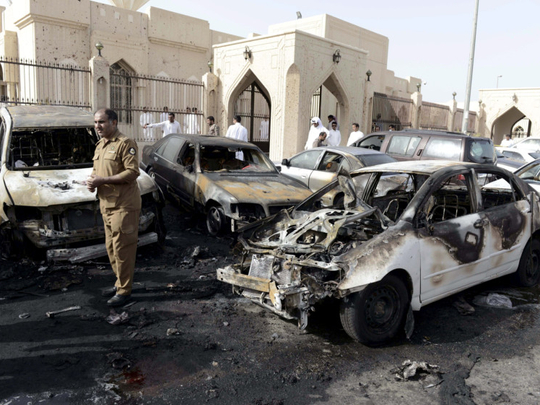
Last month, the sanctity of most residents in Saudi Arabia took a nasty jolt with the explosive violence around two mosques in two different incidents. Some 30 people, mostly worshippers, died as a result. Both the attacks took place in different cities in the eastern province of the country where the largest concentration of the Shiite community of Saudi Arabia is to be found.
Following the two incidents, the security forces increased their presence and vigilance in more than 94,000 mosques around the country. The Ministry of Islamic Affairs, the body that regulates activities of places of worship, said that it has joined forces with security agencies to protect worshippers at all mosques. A ministry spokesman said last week, “We have adopted new mechanisms for the protection of worshippers,” but he did not elaborate what those steps were.
A spokesman for the Interior Ministry acknowledged the participation of the Islamic Affairs Ministry with the Public Security department, adding that his ministry intends to “double the number of patrol police during Ramadan. “We have intensive security measures around mosques following the attack on Al Qadeeh Mosque in Qatif,” he said. New measures call for security officers to be deployed to monitor activities around mosques during Friday prayers and for security and their own safety, “people will not be allowed to pray in the courtyards”.
Homegrown
A country that until recently had only suffered violence at the hands of the Al Qaida brigade in the early 2000s suddenly finds itself being drawn into a sectarian conflict. It had been fanned undoubtedly by the ranting of some hardline clerics who issued fatwas (religious edicts) against Shiite followers. The terrorists involved in both bombing incidents were homegrown Saudis, which has added to the worry that messages of hatred have reached a far wider audience than anticipated.
Grand Mufti Shaikh Abdul Aziz Al Shaikh sounded off in his sermon condemning the attack as an attempt to divide the country. “We must understand that our country’s enemies want to corrupt and break up the Saudi nation,” he said. Saudis must stand together and not be deceived by the schemes of the enemy, he said. Calling the attacks a “shameful plot”, he noted the importance of cooperation among the country’s residents, advising them not to provide cover to terrorists “who are bent upon destabilising the kingdom”.
Many Sunni Saudis joined hands in solidarity with their Shiite brothers following the attack. In private, they admit that they had nothing against their Shiite counterparts. But the fanning of sectarianism, usually accompanied by violence, may have allowed some doubt to creep into the minds of the less informed. Such divisions were also deepened by the vitriolic rhetoric of a few hardline preachers against Shiites through their messages of suspicion and hatred during their sermons.
Religious edicts
It is interesting to note that the chancellor of Al Azhar University, Dr Ahmad Al Tayyib in a recent interview on Nile Television did not see similar threats as some of the hardline clerics. Al Azhar is the leading authority on Islamic learning and is perhaps the most credible institution globally to rule on religious edicts. Asked if there were any problems with the Shiite beliefs, he answered: “Never! Fifty years ago, Shaikh Mahmoud Shaltoot, the then chancellor of Al Azhar, had issued a fatwa that the Shiite School is the fifth Islamic School and just like the other schools.”
He was asked if marriage to the Shiite community was permissible as one would become relatives through matrimony. The chancellor’s response was: “What is wrong with this? Marriage between religions and varying faiths is allowed.”
When pointed out that Shiites have a different Quran, the chancellor was dismissive, saying: “These are the myths and superstitions .... The Shiite Quran has no difference with ours and even the script of their Quran is like our alphabet.”
In response to what the differences being raised between Shiites and Sunnis meant, Dr Al Tayyib said: “These differences are part of the policies of foreign powers who seek conflict between Shiites and Sunnis.” On a different note, the chancellor concluded that “although we may not accept segments of their [Shiite] belief as we are Sunnis, this belief does not harm ... Islam and they are Muslims.”
Isn’t that what our holy book says? Be not divided and stay united under one name ... Muslims!
Tariq A. Al Maeena is a Saudi socio-political commentator. He lives in Jeddah, Saudi Arabia.








